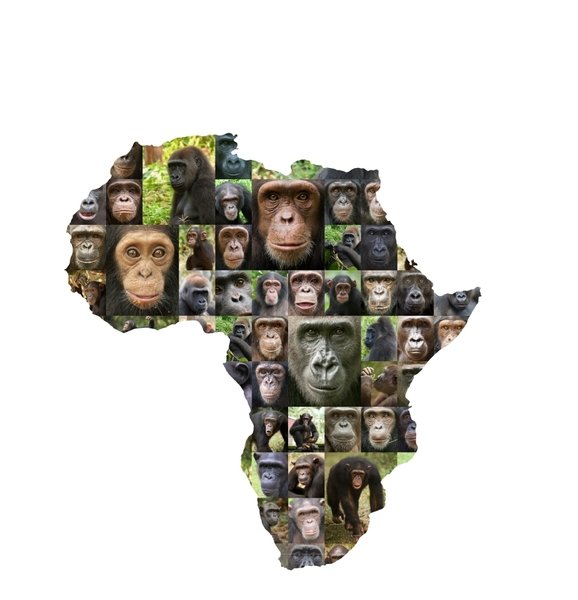Are humans great apes? To entertain such a question is to embark on a journey that straddles the intersecting realms of anthropology, genetics, and cultural studies. The notion that humans fall under the umbrella of great apes is not merely a taxonomical classification; it encapsulates deeper implications regarding our understanding of diversity, cultural relativism, and the intrinsic nature of humanity itself. Within this rich tapestry of biological and cultural complexity lies the genetic truth about our origins, challenging preconceived notions and inviting us to consider the implications of our evolutionary lineage.
The great ape family, scientifically known as Hominidae, includes orangutans, gorillas, bonobos, chimpanzees, and of course, humans. Genetic research has revealed striking similarities among these species, with humans sharing approximately 98–99% of their DNA with these primates. Such high levels of genetic resemblance compel one to reflect upon the nature of ‘humanness’ and whether it might be defined more by cultural expression than by biological distinctions. In this context, cultural relativism emerges as a vital lens through which to examine the implications of our genetic kinship.
Cultural relativism posits that a culture must be understood based on its own values and beliefs rather than judged against another standard. In exploring our relationship with great apes, it is paramount to approach the subject from a relativistic perspective. This shift invites us to recognize the shared characteristics among hominids, promoting a sense of unity rather than a hierarchy. For instance, the cognitive abilities of great apes, such as problem-solving, tool use, and even forms of communication, reflect a continuity that prompts the inquiry: if these traits are indicators of intelligence, in what ways do humans distinguish themselves?
One of the fundamental tenets of cultural relativism is the recognition of the plurality of pathways leading to human experiences. If we acknowledge that our genetic heritage is intimately intertwined with that of other great apes, we are invited to reconsider the narratives that assert human exceptionalism. This paradigmatic shift challenges the anthropocentric worldview that has dominated much of Western philosophy, suggesting instead that the experiences and expressions of other great apes deserve a more nuanced understanding. Such recognition is crucial in fostering the conservation of these species, which are often viewed through a lens of exploitation rather than coexistence.
Genetic studies have also illuminated the adaptive mechanisms that underlie the survival of great apes in diverse environmental contexts. The genetic diversity uncovered among great ape populations signifies not just biological variation but also a cultural mosaic of adaptation. This diversity raises questions about how culture, environment, and genetics intersect. For example, the dietary habits of chimpanzees vary markedly from one region to another, influenced by the availability of resources and cultural practices within their communities. A parallel can be drawn to the human experience, as cultural practices shape our interactions with the environment, leading to varying adaptations across societies.
The acknowledgment of humans as great apes offers potent implications for our ethical frameworks. If humans are akin to great apes, then understanding our shared evolutionary roots may encourage a more humane approach to our ecological footprint. This invites a critical examination of anthropogenic impacts on great ape habitats, urging a reflection on the moral responsibilities that arise from our kinship. The understanding that we are part of a broader primate family underscores the urgency for sustainable practices that honor our common heritage.
This genetic kinship challenges reductive classifications and encourages an appreciation for the richness of behavioral diversity across species. While humans may have developed complex languages and societies, other great apes exhibit intricate social structures, emotional depth, and cognitive strategies that reflect their adaptation to their ecosystems. The exploration of such behaviors not only enriches our understanding of primate intelligence but also posits cultural expressions as diverse adaptations to environmental challenges rather than merely products of human evolution.
The philosophical implications of recognizing humans as great apes extend into the domain of ethics and morality. As researchers continue to map the genetic landscape of our closest relatives, the revelations about shared ancestry compel us to reconsider the ethical treatment of these beings. Cultural relativism illuminates how societies worldwide have portrayed great apes differently, ranging from symbols of wisdom in some cultures to mere subjects for research in others. These varied perceptions profoundly affect conservation efforts and animal rights discourses, emphasizing the need for a collective re-evaluation of our relationship with non-human primates.
Embracing our identity as great apes necessitates a reframing of our cultural narratives. The stories that arise from this understanding could foster greater empathy towards other species, underscoring the importance of biodiversity for the resilience of ecosystems. Such narratives can serve as powerful tools in advocacy, bridging the gap between scientific knowledge and community action. In turn, fostering an appreciation for the complexity of our shared evolutionary journey enriches not only our understanding of what it means to be human but also our responsibilities to other beings sharing this planet.
Ultimately, acknowledging humans as great apes invites an expansive inquiry into the genetic truths that tether us to our primate counterparts. This exploration urges us to embrace cultural relativism as a foundational approach, understanding that just as genetic diversity is vital for survival, the embrace of diverse cultural perspectives is essential for our co-existence. As we navigate the intricate web of our origins and cultural expressions, this perspective promises to pique curiosity and foster a profound appreciation for the intricate bonds that unite all great apes in the shared tapestry of life.
